Gerry Adams's Blog, page 76
April 9, 2012
The Rebel County
The road from Belfast to Cork used to take forever. The distance is the same as it was 40 years ago but the motorways have transformed the journey. Bill drove Richard and this blog to Bandon in west Cork on Saturday evening in 5 hours - and that was with a break for something to eat. And all within the speed limit.
I once drove to Cork on another occasion. I was hungry when we started and along the way I reminded Paddy – who was driving - that it would be nice to stop for something to eat. But Paddy couldn't quite make up his mind where we should stop and the journey was full of: 'That looked like a good place', as we drove passed another pub or cafe.
We were in Cork before he eventually stopped. I still think that was his plan from the outset.
Saturday night was a fine spring evening. The motorways were mostly clear. When I gently and with some trepidation raised the issue of food there was a quick huddle in the front of the car and within seconds we were off the M7 and stopped at The Gandon Inn.
It's a fine old building which was designed by one James Gandon who was apparently one of the most influential architects of the 18th century and was responsible for designing, among other fine Dublin Buildings, the Customs House and Four Courts and the old Bank of Ireland.
We arrived in Bandon just after 10pm and went straight to bed. Easter Sunday morning saw the three of us up bright and early and after porridge we went for a walk along the Bandon River. DJ O Driscoll, a local Sinn Féin activist, joined us. He told us of the devastation caused to the town two years ago following a particularly heavy rain when the river overflowed its walls and much of the town centre was under 4-6 feet of water.
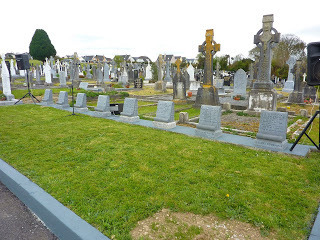
Republican plot in Bandon
The republican plot in Bandon is in the cemetery adjacent to St. Patrick's Church. When this blog and Rachel McCarthy, the local Councillor, came out of mass there was already a good crowd waiting. We were led the 100 metres from the cemetery gate to the graveside by the Bandon and District pipe band.
The republican plot contains the remains of eight IRA Volunteers from the 3rd West Cork Brigade who died in Bandon and locally during the Tan War. It was a dangerous time as a small force of IRA activists, ably led by Tom Barry and solidly supported by the local community, took on the might of the British Empire. Cork and west Cork were in the front line of that struggle and many of the best known military engagements of that war took place in this area, including Kilmichael and Crossbarry.
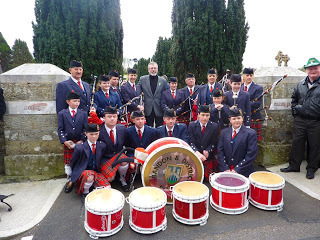
The Bandon and District Pipe Band
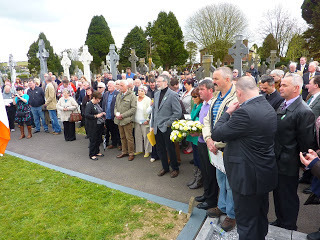
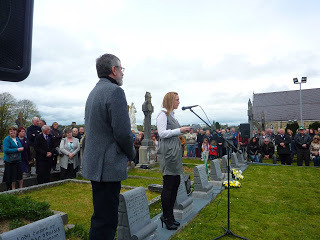
Cllr Rachel McCarthy and this blog in Bandon
After the commemoration we drove into Cork City to St. Finbarr's cemetery where there is a large republican plot. There was an excellent crowd and they were in great form.
Even before the Tan War Cork had a justly earned reputation as the 'rebel county'. It was already famous for its contribution to the Rising of 1798.
William Thompson was from Cork and his writings on social reform, his criticism of 19th century capitalism, and his promotion of the co-operative movement had a huge influence on many of the leading European socialist thinkers of that period.
James Connolly described him as 'the first Irish socialist' and as 'an original thinker, a pioneer of Socialist thought' and he dedicated a whole chapter of Labour in Irish History to him.
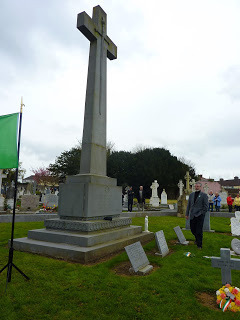
Cork Republican Plot
O Donovan Rossa the great Fenian leader was from Rosscarberry. He, like Tom Clarke and many others Fenian prisoners, suffered horrendously during his time in prison in England.
Pearse's celebrated remarks over O Donovan Rossa's grave in Glasnevin 96 years ago next Wednesday set the context for the Easter Rising the following year.
"They think that they have pacified Ireland. They think that they have purchased half of us and intimidated the other half. They think that they have foreseen everything, think that they have provided against everything; but, the fools, the fools, the fools! — They have left us our Fenian dead, and while Ireland holds these graves, Ireland unfree shall never be at peace."
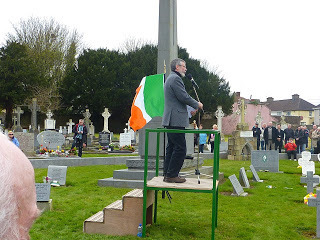
Tomas MacCurtain was Mayor of Cork when he was shot by the RIC in January 1920 and Terence MacSwiney who took his place as Mayor died on hunger strike in October of that year. His sister Mary MacSwiney was a founding member of the Cumann na mBan, a Sinn Féin activist, a TD for Cork and she spent three periods in prison. Two of these were during the Civil War when she opposed the treaty and was on hunger strike twice.
And then there is Tom Barry, one of the most formidable guerrilla leaders who ever took up arms against British rule. At the graveside in Bandon I met a republican who showed me several photographs of young west Belfast republicans who had travelled to west Cork in 1972. There they proudly stand at the Crossbarry monument with Tom Barry.
Among them were several faces I know very well, including Robert 'Moke' McMahon, an IRA Volunteer from this phase of the struggle who died last year. Moke never forgot his visit to west Cork or his meeting with the legendary Tom Barry.
Another republican of this generation was IRA volunteer and hunger striker, Bobby Sands, who was in the H Blocks when Tom Barry died in 1980.
In the midst of the horror of that place one Republican freedom fighter wrote a poem to mark the passing of another:
In dusky light, by mist, o'er hills they tread,
A column on the run,
The ghosts of fighters long since dead,
Yet n'er at rest, their guns still slung.
Now Barry leads them in the night,
Hardy souls of Cork Brigade,
To tramp the glens to morning light,
When their ghostly forms shall fade.
I have a particular fondness for Castlelyons man Tomás Ceannt who was one of those executed by the British after the 1916 Rising. In the aftermath of Easter week the British decided to arrest anyone regarded as a republican activist and a squad of RIC men were sent off to arrest Tomás and his three brothers.
There was a gun battle at the Ceannt home during which the brother's mother helped load their guns. The Head RIC man was killed as was one of the brothers, Richard.
Tomás and his brother William were convicted of treason and sentenced to death. Tomás was shot by a firing squad in Cork on May 2nd 1916. His brother's sentence was commuted. Tomás was the only person, apart from Roger Casement, to be executed by the British for actions outside of Dublin.
And not far from Bandon in Timoleague Graveyard lies IRA Volunteer Diarmaid O Neill, who was shot in London in 1996, the last Volunteer to die in this phase of the struggle.
Like every part of this island, west Cork and Cork City, are replete with stories of resistance and courage in the long struggle for Irish freedom. Easter is a special time when we remember with pride all of those men and women, who over many centuries, took up arms against colonialism and occupation.
It is a time when this blog finds the words of Bobby Sands especially appropriate.
There's an inner thing in every man,
Do you know this thing my friend?
It has withstood the blows of a million years,
And will do so to the end.
It was born when time did not exist,
And it grew up out of life,
It cut down evil's strangling vines,
Like a slashing searing knife.
It screamed aloud by Kerry lakes,
As it was knelt upon the ground,
And it died in great defiance,
As they coldly shot it down.
It is found in every light of hope,
It knows no bounds nor space
It has risen in red and black and white,
It is there in every race.
It lies in the hearts of heroes dead,
It screams in tyrants' eyes,
It has reached the peak of mountains high,
It comes searing 'cross the skies.
It lights the dark of this prison cell,
It thunders forth its might,
It is 'the undauntable thought', my friend,
The thought that says 'I'm right!'
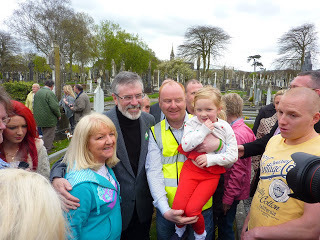
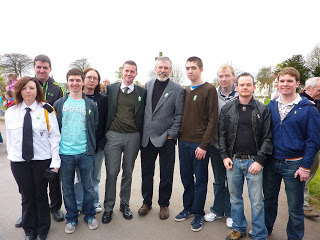
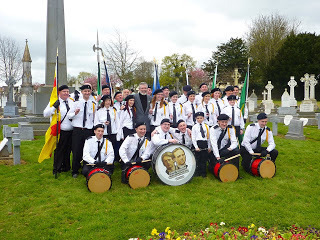

I once drove to Cork on another occasion. I was hungry when we started and along the way I reminded Paddy – who was driving - that it would be nice to stop for something to eat. But Paddy couldn't quite make up his mind where we should stop and the journey was full of: 'That looked like a good place', as we drove passed another pub or cafe.
We were in Cork before he eventually stopped. I still think that was his plan from the outset.
Saturday night was a fine spring evening. The motorways were mostly clear. When I gently and with some trepidation raised the issue of food there was a quick huddle in the front of the car and within seconds we were off the M7 and stopped at The Gandon Inn.
It's a fine old building which was designed by one James Gandon who was apparently one of the most influential architects of the 18th century and was responsible for designing, among other fine Dublin Buildings, the Customs House and Four Courts and the old Bank of Ireland.
We arrived in Bandon just after 10pm and went straight to bed. Easter Sunday morning saw the three of us up bright and early and after porridge we went for a walk along the Bandon River. DJ O Driscoll, a local Sinn Féin activist, joined us. He told us of the devastation caused to the town two years ago following a particularly heavy rain when the river overflowed its walls and much of the town centre was under 4-6 feet of water.

Republican plot in Bandon
The republican plot in Bandon is in the cemetery adjacent to St. Patrick's Church. When this blog and Rachel McCarthy, the local Councillor, came out of mass there was already a good crowd waiting. We were led the 100 metres from the cemetery gate to the graveside by the Bandon and District pipe band.
The republican plot contains the remains of eight IRA Volunteers from the 3rd West Cork Brigade who died in Bandon and locally during the Tan War. It was a dangerous time as a small force of IRA activists, ably led by Tom Barry and solidly supported by the local community, took on the might of the British Empire. Cork and west Cork were in the front line of that struggle and many of the best known military engagements of that war took place in this area, including Kilmichael and Crossbarry.

The Bandon and District Pipe Band


Cllr Rachel McCarthy and this blog in Bandon
After the commemoration we drove into Cork City to St. Finbarr's cemetery where there is a large republican plot. There was an excellent crowd and they were in great form.
Even before the Tan War Cork had a justly earned reputation as the 'rebel county'. It was already famous for its contribution to the Rising of 1798.
William Thompson was from Cork and his writings on social reform, his criticism of 19th century capitalism, and his promotion of the co-operative movement had a huge influence on many of the leading European socialist thinkers of that period.
James Connolly described him as 'the first Irish socialist' and as 'an original thinker, a pioneer of Socialist thought' and he dedicated a whole chapter of Labour in Irish History to him.

Cork Republican Plot
O Donovan Rossa the great Fenian leader was from Rosscarberry. He, like Tom Clarke and many others Fenian prisoners, suffered horrendously during his time in prison in England.
Pearse's celebrated remarks over O Donovan Rossa's grave in Glasnevin 96 years ago next Wednesday set the context for the Easter Rising the following year.
"They think that they have pacified Ireland. They think that they have purchased half of us and intimidated the other half. They think that they have foreseen everything, think that they have provided against everything; but, the fools, the fools, the fools! — They have left us our Fenian dead, and while Ireland holds these graves, Ireland unfree shall never be at peace."

Tomas MacCurtain was Mayor of Cork when he was shot by the RIC in January 1920 and Terence MacSwiney who took his place as Mayor died on hunger strike in October of that year. His sister Mary MacSwiney was a founding member of the Cumann na mBan, a Sinn Féin activist, a TD for Cork and she spent three periods in prison. Two of these were during the Civil War when she opposed the treaty and was on hunger strike twice.
And then there is Tom Barry, one of the most formidable guerrilla leaders who ever took up arms against British rule. At the graveside in Bandon I met a republican who showed me several photographs of young west Belfast republicans who had travelled to west Cork in 1972. There they proudly stand at the Crossbarry monument with Tom Barry.
Among them were several faces I know very well, including Robert 'Moke' McMahon, an IRA Volunteer from this phase of the struggle who died last year. Moke never forgot his visit to west Cork or his meeting with the legendary Tom Barry.
Another republican of this generation was IRA volunteer and hunger striker, Bobby Sands, who was in the H Blocks when Tom Barry died in 1980.
In the midst of the horror of that place one Republican freedom fighter wrote a poem to mark the passing of another:
In dusky light, by mist, o'er hills they tread,
A column on the run,
The ghosts of fighters long since dead,
Yet n'er at rest, their guns still slung.
Now Barry leads them in the night,
Hardy souls of Cork Brigade,
To tramp the glens to morning light,
When their ghostly forms shall fade.
I have a particular fondness for Castlelyons man Tomás Ceannt who was one of those executed by the British after the 1916 Rising. In the aftermath of Easter week the British decided to arrest anyone regarded as a republican activist and a squad of RIC men were sent off to arrest Tomás and his three brothers.
There was a gun battle at the Ceannt home during which the brother's mother helped load their guns. The Head RIC man was killed as was one of the brothers, Richard.
Tomás and his brother William were convicted of treason and sentenced to death. Tomás was shot by a firing squad in Cork on May 2nd 1916. His brother's sentence was commuted. Tomás was the only person, apart from Roger Casement, to be executed by the British for actions outside of Dublin.
And not far from Bandon in Timoleague Graveyard lies IRA Volunteer Diarmaid O Neill, who was shot in London in 1996, the last Volunteer to die in this phase of the struggle.
Like every part of this island, west Cork and Cork City, are replete with stories of resistance and courage in the long struggle for Irish freedom. Easter is a special time when we remember with pride all of those men and women, who over many centuries, took up arms against colonialism and occupation.
It is a time when this blog finds the words of Bobby Sands especially appropriate.
There's an inner thing in every man,
Do you know this thing my friend?
It has withstood the blows of a million years,
And will do so to the end.
It was born when time did not exist,
And it grew up out of life,
It cut down evil's strangling vines,
Like a slashing searing knife.
It screamed aloud by Kerry lakes,
As it was knelt upon the ground,
And it died in great defiance,
As they coldly shot it down.
It is found in every light of hope,
It knows no bounds nor space
It has risen in red and black and white,
It is there in every race.
It lies in the hearts of heroes dead,
It screams in tyrants' eyes,
It has reached the peak of mountains high,
It comes searing 'cross the skies.
It lights the dark of this prison cell,
It thunders forth its might,
It is 'the undauntable thought', my friend,
The thought that says 'I'm right!'



Published on April 09, 2012 04:59
April 3, 2012
The Belfast of the Titanic
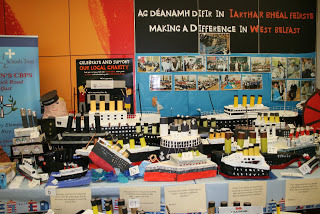
St. Aidan's Exhibition on Titanic
On April 15th it will be one hundred years since the Titanic slipped beneath the waves of the north Atlantic. The story of the Titanic has been told and retold for decades now. The unsinkable ship built in Belfast which sank on its maiden voyage in 1912 with the loss of 1514 lives.
Last weekend as I walked through Sainsbury's supermarket on the Falls Road a special exhibition of cardboard and papier-mâché Titanic's made by local school children from St. Aidan's on the Whiterock Road were on show. They were all shapes and sizes. Some of them were three feet long. One had an iceberg and a sinking Titanic beside it.
The loss of the Titanic has been the storyline for movies – one of the most successful ever – simply entitled Titanic – is being re-released this week in 3D to mark the centenary of the tragedy and probably make another staggering profit for its makers.
This blog remembers the black and white 'A night to remember' movie made in 1958. Currently there is a drama series on one of the British television networks dealing with the sinking. And over the years the fate of the Titanic has featured in a host of other dramas from the 1960's 'Time Tunnel' to a recent Christmas Dr. Who.
What is it that has so captivated the imagination and hearts of countless millions around the world?
Is it the irony of the unsinkable ship that sank; or the countless stories of loss and tragedy among its 1514 victims; or the heroism of the band that kept playing to the end?
The survival accounts of those who lived through that ordeal make compelling reading. Among them the 14 Irish emigrants, men and women, sailing to a new life in the USA from Addergoole, in County Mayo. Like millions of others they were fleeing poverty and the political turmoil of an Ireland still in the grip of British colonialism, in the hope of a better live in America.
The 14 were aged between 17 and 42. They joined the Titanic in what was then Queenstown now Cobh in county Cork. Four days later 11 were dead. The Western People described the impact on Addergoole; ' when the first news of the appalling catastrophe reached their friends the whole community was plunged into unutterable grief.'
But it was also far from easy for the three survivors. The youngest, Annie McGowan had to spend months in hospital recovering from her experience. When she was discharged she had only a nightgown and a coat. A US newspaper recorded how Annie and her friend Annie Kate Kelly who was 20 were 'given an old pair of shoes but they were forced to make the trip from New York to Chicago in their coats and night gowns. They had no dresses nor underwear.'
Their story is not exceptional.
The facts behind the Titanic are generally well known. It was one of three Olympic class ships built by Belfast shipbuilders Harland and Wolff for the White Star line. It was the biggest liner of its day and weighed in at a massive 46,000 tons. It was 882 feet and 9 inches long and at its widest it was 92 feet and 6 inches.
It ploughed into an iceberg just before midnight on April 14th and sank approximately two and a half hours later. 710 passengers survived although there was room for around 400 more on the lifeboats, many of which were launched only half full.
It is also widely known that class played its part in determining who lived and who died. 3% of first class passengers died. 54% of third class died. 5 out of 6 first class children died and all second class children survived. 52 out of 79 children in third class died.
But there is another part of the Titanic story which is rarely told and must not be ignored.
Belfast's two shipyards, Harland and Wolff and Workman, Clarke and Co were notoriously sectarian employers. The numbers of Catholics employed by the firms was tiny and frequently in the course of the 19th century and early twentieth century catholic workers were expelled from the yards, frequently beaten and some were killed.
The story of the shipyards is the story of division, sectarianism and exploitation in Belfast.
In 1800 Belfast had a population of some 20,000 citizens. 60 years later it had increased tenfold and by the end of the century the population had reached 350,000.
The number of Catholics living in the city also increased from 4,000 in 1800 to around a third of the population in 1900.
Living and working conditions were appalling. Overcrowding in slum housing with no sanitation was the norm for working people. Hours were long and child labour was prevalent. Conditions for women in the Linen mills were notoriously difficult and dangerous.
However, a structured system of discrimination, encouraged by an alliance of the unionist political elite, the Orange Order and employers meant that all of the well paid, skilled work and trades were predominantly protestant, especially the shipbuilding and engineering
Dividing workers was to the advantage of the owners as it prevented the development of effective labour organisations arguing for better wages and conditions for workers. Playing on these sectarian divisions also ensured that political unionism was able to retain the loyalty of working class protestants with whom they otherwise had little in common.
It is no accident that the worst years of riots and violence in Belfast, including expulsions of Catholics from the shipyards and other engineering factories coincide with the introduction of the three Home Rule Bills for Ireland – 1886, 1893 and 1912 – and the government of Ireland Act in 1920. In July 1912 up to 8,000 catholic workers were expelled from the shipyards and other factories in the city and 8 years later the pattern was repeated with up to 10,000 men Catholic men expelled from the shipyards and four major engineering works and 1,000 women from the linen mills.
One British Labour leader summed it up well the same year Titanic was launched when he said: 'In Belfast you get Labour conditions the like of which you get in no other town, no other city of equal commercial prosperity from John O'Groats to Land's End or from the Atlantic to the North Sea. It is maintained by an exceedingly simple device ...Whenever there is an attempt to root out sweating in Belfast the Orange big drum is beaten ...'
In 1911 as the Titanic was being built the census recorded that there were 6809 shipbuilders in Belfast. Of these 518 or 7.6% were Catholic.
This is a part of the legacy of the British presence in Ireland and of the divisions it fostered. The roots of decades of conflict are to be found in that history and experience.
Today, as a result of the peace process, there is a unique power sharing system of government in the north of Ireland. As it seeks to build a better future for citizens and create employment it is investing in the regeneration of the old shipyards and in a new Titanic Belfast Exhibition Centre which is the biggest Titanic themed tourist attraction n in the world. It is hoped it will bring in hundreds of thousands of tourists and help create much needed employment.
But as we celebrate this potential for the future we must also remember the type of society which built the Titanic, commit to learning the lessons of that time and ensuring that those divisions and hardships are relegated to the history books.
Published on April 03, 2012 08:10
March 27, 2012
The Mahon Tribunal
This evening and for the next three days the Dáil will hear statements from all parties and independents on the Mahon Tribunal which was published last week.
This evening I had to speak for Sinn Féin in our first contribution.
The 'Tribunal of Inquiry into Certain Planning Matters and Payments' was established almost 15 years ago in November 1997 and since then it has heard evidence from over 400 witnesses. It was the longest running public inquiry and produced four interim reports.
This is my contribution:
Bhí an fiosrúchán seo dírithe ar chaimiléireacht a bhí ceaptha a bheith ag dul ar aghaidh maidir leis an bpróiseas pleanála, sa chás mar shampla is go raibh íocaíochtaí á ndéanamh le polaiteoirí.
The Tribunals conclusions and its criticism of the political elite in this state are damning.
'Corruption in Irish political life was both endemic and systemic. It affected every level of government, from some holders of top ministerial offices to some local councillors and its existence was widely known and widely tolerated.'
But these words of accusation and condemnation only touch on one aspect of the institutionalised sleaze and corruption that was rife in this state.
It wasn't just political life that was corrupt.
So too was the business elite.
Together they formed golden circles of self-interest dedicated to preserving their wealth and privilege and power.
And this corruption did not just begin twenty years ago when the Beef Tribunal began its deliberations or later with the McCracken Tribunal or Flood/Mahon.
Institutionalised corruption and gombeenism were part and parcel of British colonial rule on this island and these practices survived and thrived in the post-colonial period.
Liam Mellows warned of this in the Treaty debates. He said :...`Men will get into positions, men will hold power, and men who get into positions and hold power will desire to remain undisturbed and will not want to be removed - or will not take a step that will mean removal in case of failure.'
Mellows was right.
Ní amháin a raibh an ceart aige ach bhí fís difriúl aige de Phoblacht agus rialú ina mbeadh an saoránach mar chroí láir tógáil stát nua.
Politicians and churchmen and business people did get into positions of power and abused that power in their self-interests and not in the interests of citizens.
Partition created not one but two conservative states on this island ruled by two conservative elites.
And the closed, narrow, post-civil war society that emerged out of partition in this part of the island was characterised by economic failure, by emigration, by backwardness on social issues, by inequality and by the failure to protect the most vulnerable of our citizens.
Those who built this state also turned their back on the people of the north.
They turned their backs on the ideals of independence and of a genuine republic; on the rights of citizens enshrined in the 1916 Proclamation.
And as it evolved the political elite in this state was increasingly in hock to the Catholic Hierarchy.
The system here for decades abdicated responsibility for the care of children and single women and allowed a regime in institutions that abused and criminalised and terrified those who found themselves locked in these places.
The political establishment and the business elite which emerged in the aftermath of partition — the senior civil servants, the bankers, the judges, big business, the politicians of Cumann na Gael, Fine Gael and Fianna Fáil, and the Ulster Unionist Party in the north, created systems that entrenched their own privilege.
Systemic corruption bred a culture of corruption. It was part of the way that we were.
Corruption and backhanders and brown envelopes became acceptable – a normal way of winning political favour, of rezoning land for profit, and of buying votes and influence.
Cronyism became endemic.
Who you knew was more important than ability or fairness or what was right.
The 'golden circles' of big business and speculators, of bankers and financiers and developers, allied to a corrupt political elite, grew rich on the exploitation of others.
Léiríonn an tuairisc seo do dhaoine an santachas a bhí i réim ag elite áirithe ins an sochaí seo a ndearnadh creachadh ar ár maoin inar raibh ar an mórlach íoc as le toradh turraingtheach.
Family dynasties, party connections and donations to political campaigns all entrenched this corruption.
This was made easier by the concentration of political power in the hands of a few.
Weak and ineffective legal checks and balances, and little oversight and enforcement of laws to challenge corruption, made dishonesty and corruption easy and acceptable.
And the arrogance of the 'golden circles' has seen powerful individuals consider themselves above the rules that apply to ordinary citizens.
That double standard was graphically demonstrated in the famous television broadcast by the then Taoiseach Charles Haughey who told citizens to tighten their belts, while he lived the highlife at the taxpayer's expense.
Agus ní raibh an hasc 'cosy' seo idir pholaiteoirí agus fir ghnó, baincéirí, tógáilaithe i bhFianna Fáil amháin.
This wasn't limited just to Fianna Fáil.
In a classic example of the double standards that have applied in the political culture, in 1993 former Taoiseach and Fine Gael leader Garret Fitzgerald had debts of almost £200,000 which he owed to AIB and Ansbacher written off.
Just written off! Sin é. No explanation.
How many ordinary citizens, many now in negative equity and struggling to survive, will have the balance of their loans written off by AIB?
New rules and laws have to be put into place to end corrupt practices.
Too many of our citizens live each day with the consequences of corruption.
There are the many homeowners in mortgage distress because some politicians chose to facilitate developers and bankers and pursued an economic strategy which brought the state to its knees.
There are the growing numbers of elderly citizens who don't know if they will have a public nursing bed when and if they need it.
Or the thousands of patients who languish on hospital trolleys because successive governments have failed to invest in public health services, choosing instead to promote privatisation.
And there's the rub!
If you decide to privatise a public health service that's the start of corrupting the service.
That's the start of the process.
You run health for profit instead of as a right of a citizen that's where the corruption starts and that's where the corruption is currently ongoing at this time.
What of citizens living in sprawling, unfinished housing estates, with no shops, no youth facilities, no playing fields, no amenities and no place for elderly people to gather.
Each one of us have those across this island and in our constituencies.
While Mahon has revealed that politicians from Fianna Fáil and Fine Gael and Labour took bribes from developers perverting the planning process for profit, the upper echelons of Fianna Fáil in particular stands indicted.
And while the Fianna Fáil leader Deputy M
Will he take action against those current Fianna Fáil deputies who questioned not only the legality of the Tribunal, but also the integrity of its members?
The Mahon Report demands firm measures by this government to deal with corruption.
Citizens are demanding resolute action.
If we are to end corruption and ensure transparency and accountability more needs to be done to clean up politics and to restore public confidence in the political system.
For example, one suggestion is the introduction of legislation that would allow impeachment or removal from the Dáil or the Seanad of any Oireachtas member involved in corruption, deliberate misuse of public money or fraud.
Furthermore, and it's so obvious, former politicians found guilty of corruption should have their public pensions taken from them.
Particularly so when it comes to former Government Ministers or Taoisigh who enjoy excessive annual pension pay outs.
The DPP needs to conduct a full and prompt investigation into the findings of the Mahon report working with the Gardaí to bring charges of corruption to the courts as soon as possible.
It's quite possible that none of what has been revealed would have come to light were it not for the role of whistle-blowers like James Gogarty and Tom Gilmartin.
Whistleblowers such as these are key in exposing and preventing corruption.
It is imperative that legislation is brought forward to protect whistle-blowers.
I welcome the publication of the draft heads of the new whistle-blower legislation by Minister for Public Expenditure and Reform Brendan Howlin.
If citizens are to regain their confidence in the political system, the government must implement the recommendations of Judge Mahon.
No excuses. No fudging.
Cronyism and privilege must be ended.
The Mahon tribunal investigated corruption in Dublin, but do we imagine for one second that this was all confined to the Pale?
Did it not happen elsewhere throughout the state?
I note that an internal review of planning decisions by a number of local authorities is underway but still not completed.
The previous Environment Minister John Gormley announced an independent investigation into six local authorities involved in controversial planning decisions.
However one of the first acts of the current Minister for the Environment Phil Hogan was to abandon plans for independent investigations dismissing them as mostly "spurious".
This includes an investigation into a relief road in Carlow, in his constituency, which was first highlighted in 2008 and led to a compensation case costing a total of €1.1 million.
The public need to have confidence that every decision taken is above reproach.
The internal investigation needs to be completed and the findings made public.
The Mahon report and its indictment of the political system, is a far cry from the ethos and high standards demonstrated by those whose bravery and courage and self-sacrifice we will commemorate and celebrate in 12 days time.
Or indeed to those who founded Fianna Fáil.
The Republic they fought and died for at Easter 1916 and in subsequent generations, is encapsulated in the words of the Proclamation of 1916.
For those who abandoned and corrupted its objectives the Proclamation is no more than a piece of paper to which they occasionally pay lip service.
But it is much more than that.
It is a charter of Liberty and Freedom and Rights as important as anywhere else in the modern world.
The Republic it envisages guarantees religious and civil liberty, equal rights and equal opportunities for all its citizens.
The Proclamation contains a commitment to cherish all the children of the nation equally.
Not to exploit or abuse or steal from them but a promise to every Irish man, woman and child that they can share in the dignity of human kind and of this wonderful island that we live in.
Our party and I'm sure other parties and other representatives here are for a new Republic, a genuine republic, a republic fit for the 21st century.
A republic across this entire island where orange and green unite.
A republic based on citizenship and citizens' rights; a republic that is accessible and responsive and inclusive to the needs of citizens and which upholds civil and human rights.
That republic must include rural Ireland and the protection of our uniquely rural way of life.
It must ensure that Gaeltacht communities thrive and the Irish language has the support required to flourish as a spoken language.
A republic that reaches out to and embraces our unionist brothers and sisters.
A new Ireland built on positive change, on equality and partnership.
A republic that is people centred, owned and responsible to the people and not to elites.
The people of Ireland deserve more than what we have at this time.
We deserve to be free of division, injustice and corruption.
Where wealth is invested creatively and fairly, and where poverty is a thing of the past.
So, that's what I believe in. I'm sure many others share that belief and we should not let the revelations of corruption and graft put us off from building this new Ireland, this new republic.
The resources to build that – even at this time of great adversity - exist now.
This isn't a pipe dream. This isn't an aisling.
This is a real and achievable goal.
At Easter 1993, almost 20 years ago, John Hume and I issued our first joint statement.
We said that the 'most pressing issue facing the people of Ireland and Britain today is the question of lasting peace and how it can best be achieved' and we identified as our primary objecxtive 'reaching agreement on a peaceful and democratic accord for all on this island'.
John Hume was vilified and our vision was attacked by all sides in this chamber. By all parties here.
But five years later the Good Friday Agreement was achieved.
So, nothing is impossible.
What is needed now is a vision of a different Ireland and more especially the political will to make this happen.
It can be done.
This evening I had to speak for Sinn Féin in our first contribution.
The 'Tribunal of Inquiry into Certain Planning Matters and Payments' was established almost 15 years ago in November 1997 and since then it has heard evidence from over 400 witnesses. It was the longest running public inquiry and produced four interim reports.
This is my contribution:
Bhí an fiosrúchán seo dírithe ar chaimiléireacht a bhí ceaptha a bheith ag dul ar aghaidh maidir leis an bpróiseas pleanála, sa chás mar shampla is go raibh íocaíochtaí á ndéanamh le polaiteoirí.
The Tribunals conclusions and its criticism of the political elite in this state are damning.
'Corruption in Irish political life was both endemic and systemic. It affected every level of government, from some holders of top ministerial offices to some local councillors and its existence was widely known and widely tolerated.'
But these words of accusation and condemnation only touch on one aspect of the institutionalised sleaze and corruption that was rife in this state.
It wasn't just political life that was corrupt.
So too was the business elite.
Together they formed golden circles of self-interest dedicated to preserving their wealth and privilege and power.
And this corruption did not just begin twenty years ago when the Beef Tribunal began its deliberations or later with the McCracken Tribunal or Flood/Mahon.
Institutionalised corruption and gombeenism were part and parcel of British colonial rule on this island and these practices survived and thrived in the post-colonial period.
Liam Mellows warned of this in the Treaty debates. He said :...`Men will get into positions, men will hold power, and men who get into positions and hold power will desire to remain undisturbed and will not want to be removed - or will not take a step that will mean removal in case of failure.'
Mellows was right.
Ní amháin a raibh an ceart aige ach bhí fís difriúl aige de Phoblacht agus rialú ina mbeadh an saoránach mar chroí láir tógáil stát nua.
Politicians and churchmen and business people did get into positions of power and abused that power in their self-interests and not in the interests of citizens.
Partition created not one but two conservative states on this island ruled by two conservative elites.
And the closed, narrow, post-civil war society that emerged out of partition in this part of the island was characterised by economic failure, by emigration, by backwardness on social issues, by inequality and by the failure to protect the most vulnerable of our citizens.
Those who built this state also turned their back on the people of the north.
They turned their backs on the ideals of independence and of a genuine republic; on the rights of citizens enshrined in the 1916 Proclamation.
And as it evolved the political elite in this state was increasingly in hock to the Catholic Hierarchy.
The system here for decades abdicated responsibility for the care of children and single women and allowed a regime in institutions that abused and criminalised and terrified those who found themselves locked in these places.
The political establishment and the business elite which emerged in the aftermath of partition — the senior civil servants, the bankers, the judges, big business, the politicians of Cumann na Gael, Fine Gael and Fianna Fáil, and the Ulster Unionist Party in the north, created systems that entrenched their own privilege.
Systemic corruption bred a culture of corruption. It was part of the way that we were.
Corruption and backhanders and brown envelopes became acceptable – a normal way of winning political favour, of rezoning land for profit, and of buying votes and influence.
Cronyism became endemic.
Who you knew was more important than ability or fairness or what was right.
The 'golden circles' of big business and speculators, of bankers and financiers and developers, allied to a corrupt political elite, grew rich on the exploitation of others.
Léiríonn an tuairisc seo do dhaoine an santachas a bhí i réim ag elite áirithe ins an sochaí seo a ndearnadh creachadh ar ár maoin inar raibh ar an mórlach íoc as le toradh turraingtheach.
Family dynasties, party connections and donations to political campaigns all entrenched this corruption.
This was made easier by the concentration of political power in the hands of a few.
Weak and ineffective legal checks and balances, and little oversight and enforcement of laws to challenge corruption, made dishonesty and corruption easy and acceptable.
And the arrogance of the 'golden circles' has seen powerful individuals consider themselves above the rules that apply to ordinary citizens.
That double standard was graphically demonstrated in the famous television broadcast by the then Taoiseach Charles Haughey who told citizens to tighten their belts, while he lived the highlife at the taxpayer's expense.
Agus ní raibh an hasc 'cosy' seo idir pholaiteoirí agus fir ghnó, baincéirí, tógáilaithe i bhFianna Fáil amháin.
This wasn't limited just to Fianna Fáil.
In a classic example of the double standards that have applied in the political culture, in 1993 former Taoiseach and Fine Gael leader Garret Fitzgerald had debts of almost £200,000 which he owed to AIB and Ansbacher written off.
Just written off! Sin é. No explanation.
How many ordinary citizens, many now in negative equity and struggling to survive, will have the balance of their loans written off by AIB?
New rules and laws have to be put into place to end corrupt practices.
Too many of our citizens live each day with the consequences of corruption.
There are the many homeowners in mortgage distress because some politicians chose to facilitate developers and bankers and pursued an economic strategy which brought the state to its knees.
There are the growing numbers of elderly citizens who don't know if they will have a public nursing bed when and if they need it.
Or the thousands of patients who languish on hospital trolleys because successive governments have failed to invest in public health services, choosing instead to promote privatisation.
And there's the rub!
If you decide to privatise a public health service that's the start of corrupting the service.
That's the start of the process.
You run health for profit instead of as a right of a citizen that's where the corruption starts and that's where the corruption is currently ongoing at this time.
What of citizens living in sprawling, unfinished housing estates, with no shops, no youth facilities, no playing fields, no amenities and no place for elderly people to gather.
Each one of us have those across this island and in our constituencies.
While Mahon has revealed that politicians from Fianna Fáil and Fine Gael and Labour took bribes from developers perverting the planning process for profit, the upper echelons of Fianna Fáil in particular stands indicted.
And while the Fianna Fáil leader Deputy M
Will he take action against those current Fianna Fáil deputies who questioned not only the legality of the Tribunal, but also the integrity of its members?
The Mahon Report demands firm measures by this government to deal with corruption.
Citizens are demanding resolute action.
If we are to end corruption and ensure transparency and accountability more needs to be done to clean up politics and to restore public confidence in the political system.
For example, one suggestion is the introduction of legislation that would allow impeachment or removal from the Dáil or the Seanad of any Oireachtas member involved in corruption, deliberate misuse of public money or fraud.
Furthermore, and it's so obvious, former politicians found guilty of corruption should have their public pensions taken from them.
Particularly so when it comes to former Government Ministers or Taoisigh who enjoy excessive annual pension pay outs.
The DPP needs to conduct a full and prompt investigation into the findings of the Mahon report working with the Gardaí to bring charges of corruption to the courts as soon as possible.
It's quite possible that none of what has been revealed would have come to light were it not for the role of whistle-blowers like James Gogarty and Tom Gilmartin.
Whistleblowers such as these are key in exposing and preventing corruption.
It is imperative that legislation is brought forward to protect whistle-blowers.
I welcome the publication of the draft heads of the new whistle-blower legislation by Minister for Public Expenditure and Reform Brendan Howlin.
If citizens are to regain their confidence in the political system, the government must implement the recommendations of Judge Mahon.
No excuses. No fudging.
Cronyism and privilege must be ended.
The Mahon tribunal investigated corruption in Dublin, but do we imagine for one second that this was all confined to the Pale?
Did it not happen elsewhere throughout the state?
I note that an internal review of planning decisions by a number of local authorities is underway but still not completed.
The previous Environment Minister John Gormley announced an independent investigation into six local authorities involved in controversial planning decisions.
However one of the first acts of the current Minister for the Environment Phil Hogan was to abandon plans for independent investigations dismissing them as mostly "spurious".
This includes an investigation into a relief road in Carlow, in his constituency, which was first highlighted in 2008 and led to a compensation case costing a total of €1.1 million.
The public need to have confidence that every decision taken is above reproach.
The internal investigation needs to be completed and the findings made public.
The Mahon report and its indictment of the political system, is a far cry from the ethos and high standards demonstrated by those whose bravery and courage and self-sacrifice we will commemorate and celebrate in 12 days time.
Or indeed to those who founded Fianna Fáil.
The Republic they fought and died for at Easter 1916 and in subsequent generations, is encapsulated in the words of the Proclamation of 1916.
For those who abandoned and corrupted its objectives the Proclamation is no more than a piece of paper to which they occasionally pay lip service.
But it is much more than that.
It is a charter of Liberty and Freedom and Rights as important as anywhere else in the modern world.
The Republic it envisages guarantees religious and civil liberty, equal rights and equal opportunities for all its citizens.
The Proclamation contains a commitment to cherish all the children of the nation equally.
Not to exploit or abuse or steal from them but a promise to every Irish man, woman and child that they can share in the dignity of human kind and of this wonderful island that we live in.
Our party and I'm sure other parties and other representatives here are for a new Republic, a genuine republic, a republic fit for the 21st century.
A republic across this entire island where orange and green unite.
A republic based on citizenship and citizens' rights; a republic that is accessible and responsive and inclusive to the needs of citizens and which upholds civil and human rights.
That republic must include rural Ireland and the protection of our uniquely rural way of life.
It must ensure that Gaeltacht communities thrive and the Irish language has the support required to flourish as a spoken language.
A republic that reaches out to and embraces our unionist brothers and sisters.
A new Ireland built on positive change, on equality and partnership.
A republic that is people centred, owned and responsible to the people and not to elites.
The people of Ireland deserve more than what we have at this time.
We deserve to be free of division, injustice and corruption.
Where wealth is invested creatively and fairly, and where poverty is a thing of the past.
So, that's what I believe in. I'm sure many others share that belief and we should not let the revelations of corruption and graft put us off from building this new Ireland, this new republic.
The resources to build that – even at this time of great adversity - exist now.
This isn't a pipe dream. This isn't an aisling.
This is a real and achievable goal.
At Easter 1993, almost 20 years ago, John Hume and I issued our first joint statement.
We said that the 'most pressing issue facing the people of Ireland and Britain today is the question of lasting peace and how it can best be achieved' and we identified as our primary objecxtive 'reaching agreement on a peaceful and democratic accord for all on this island'.
John Hume was vilified and our vision was attacked by all sides in this chamber. By all parties here.
But five years later the Good Friday Agreement was achieved.
So, nothing is impossible.
What is needed now is a vision of a different Ireland and more especially the political will to make this happen.
It can be done.
Published on March 27, 2012 11:43
March 26, 2012
A FUNNY THING HAPPENED ON THE WAY TO THE WHITE HOUSE.
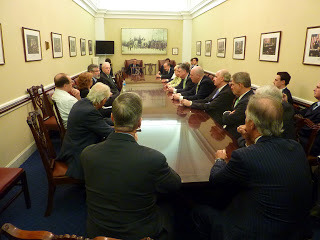
Briefing Congressional leaders
It was Joe Crawley who reminded me. Then the funny thing was nearly everyone else said more or less the same thing as we bumped into them on the way to the White House.
'It's hard to imagine that its seventeen years since you first came to the USA'. Joe said.
We were at a well attended briefing with Congress members on Capitol Hill. Myself, Richard, Rita O Hare and Jim Cullen.
Joe is a Congress member for New York. Regular readers of this blog will be familiar with Rita, our Representative in the USA and with Richard. Jim Cullen is the new recently appointed President of the Friends of Sinn Féin in the USA. He has big shoes to fill. The last and first person to hold that post was Larry Downes. Larry did a brilliant job setting up Friends of Sinn Féin and leading it in the States until recently. This blog thanks and commends him for his commitment, dedication and friendship.
Jim Cullen will bring his own special qualities to this vitally important work. We all wish him well and I look forward to working with Jim in the time ahead.
Which brings me back to the briefing on Capitol Hill. Some of those present have kept faith with the Irish cause for decades. They included Peter King and Richie Neil, Elliot Engel and other stalwarts. Rita and I gave them an update on the current situation in Ireland and raised a number of issues including the plight of the undocumented Irish.
'A great deal of progress since the first time you came here.' Richie said as we mapped out what needs to be done.
That's when Joe reminded us that that was seventeen years ago when I first came to New York. Hardly seems like it.
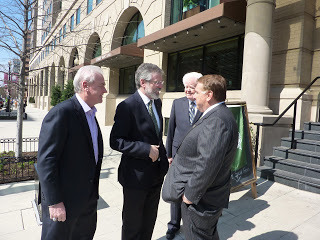
Terry O Sullivan; mise and Jimmy Hoffa
The previous day at a Friends of Sinn Féin lunch with Labour leaders we were joined by Martin McGuinness. Terry O Sullivan who is President of the Labours International Union of North America and Joseph Smith, our hosts, uplifted us with their enthusiasm.
This year ten current and former Presidents and Secretary Treasurers of the biggest unions in the USA came along with others to be briefed on the situation in Ireland and to celebrate St. Patrick's Day.
Along with Terry were James Hoffa, President of the Teamsters union; Robert Scardelletti, National President of the Transport and Communications Union; Kinsey Robinson, President of the Roofers Union; Sean McGarvey, Secretary –Treasurer of BCT; A.L. Monroe retired President of the Painters Union; Barbara Easterling, retired Secretary-General of the Communication Workers of America; John Flynn, retired President of the Bricklayers Union; John Hegarty National President of the Postal Mail Handlers Union; and Larry Hanley, National President of the Amalgamated Transit Union.
I urged them to raise with the Irish government their participation in its planned Constitutional Convention.
The previous week the government acknowledged that voting rights for Irish passport holders in Presidential elections will be on the agenda for the constitutional convention. While this is a welcome development it doesn't go far enough. The diaspora, especially Irish America, has played a crucial role in encouraging the peace process and in bringing jobs to the island of Ireland.
The government has consciously sought to reach out to the Global Irish through a number of initiatives and the Taoiseach has been in the USA several times in recent months seeking to woo business leaders to invest in the state.
The Global Irish want to support Ireland. The Irish government should go beyond platitudes and reciprocate the diaspora's desire to help by connecting it back into Ireland in a practical way through, for example, the extension of Presidential voting rights to passport holders.
It is also sensible that any extension of President voting rights should extend to citizens living in the north.
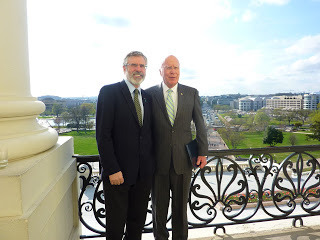
Senator Pat Leahy
After the briefing with the congressional leaders I met Senator Pat Leahy in his office. He reminded us of the engagement with President Clinton which led to this column getting a visa all those years ago. And later in the White House Jean Kennedy Smith, who was US Ambassador to Dublin at the time, looking well and in great form, asked after Father Alec Reid.
By chance Father Alec and I spent an hour walking and singing songs of old Dublin in honour of our national saint the week before so I was able to bring Jean up to date on all these goings-ons.
Then to my great delight who swept into sight but Oscar winners Terry George and Oorlagh. I saw their film The Shore just before it won Oscar fame and I was captivated by it. Since then I have been encouraging everyone to watch it. The Shore is a great story and a beautifully made film. Well done to all involved.
The White House was packed. The Taoiseach and President Obama received a rapturous welcome.
The following morning I met Secretary of State Hilary Clinton. I told her that the Obama party might not go on as long into the wee hours as it did when she and her husband were the hosts but it is still mighty craic. And why not? The man from Moneygall is justifiably proud of his Irish roots. And so he should be.
Our discussions ranged across the state of the economies north and south, including the severe cuts to the block grant imposed by the British government; the transfer of fiscal powers from London to Belfast; outstanding issues arising from the Good Friday Agreement and the need for greater co-operation and harmonisation north and south.
We also spoke about the role of the Irish diaspora, voting in Irish Presidential elections for Irish passport holders living abroad, and the upcoming Constitutional Convention being organised by the Irish government.
I expressed to her my concerns at the failure of the British government to engage properly with the process and a number of specific failures by it to implement the Good Friday Agreement.
And then on Wednesday evening we were on our way back to Belfast. It was a short tiring couple of days during which my jet lag didn't quite catch up with me.
St. Patrick's week is an important opportunity to engage with Irish America, to take stock, to celebrate and to move on again. There is still a lot of work to do for Ireland and we will need the help of the Irish diaspora in the time ahead to complete that journey.
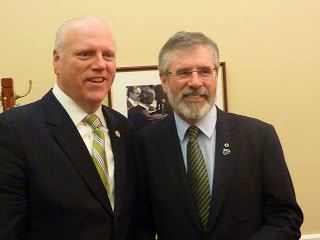
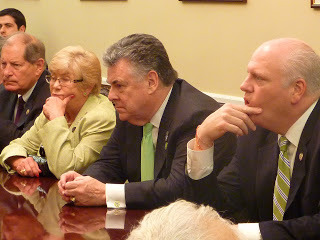
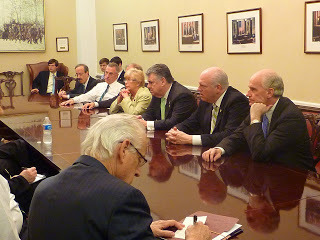
Published on March 26, 2012 02:53
March 20, 2012
The Tiger Hunt mindset and Shoot-to-kill
The role of British forces in countless actions overseas after world war two were generally presented publicly by it as 'policing actions'. The enemy was often presented as criminal or a terrorist or a communist and black propaganda served up by a largely compliant British media presented them as sub-human, subversive, cruel, ruthless and brutal.In truth these military operations were desperate attempts by a dying imperial power to hang on to colonies which were demanding independence.By the time of Operation Banner in 1969, the British Army name for its military involvement in the north of Ireland, the British Empire was part of history. It had fought and lost in countless political and military actions in Africa, the Middle East, India and South East Asia. This colonial experience of war and politics was a fundamental part of the British military psyche. It generated several theoretical books on the role of counter-insurgency techniques with the most widely read, and the most influential being Kitson's 'Low Intensity Operations: Subversion, Insurgency and Counter-Insurgency', which this blog has written about before.Robert Taber in his book 'War of the Flea' argued that for a guerrilla movement to succeed it needed the support of the people or at the very least a significant proportion of the people.Kitson understood this so his strategies were about subverting that support through reshaping government structures, the judiciary, the law, the police and the media all with the aim of defeating the enemy. He wrote:
'The fundamental concept is the working of the triumvirate, civil, military and police, as a joint and integrated organisation from the highest to the lowest level of policy making, planning and administration.'
Kitson also defended the use of death squads and the corruption of the judicial process. Counter-gangs, which he formed and participated in while in Kenya, had been successful in helping defeat what was labelled as the 'Mau Mau insurgency' although Britain still had to lower the flag and leave in 1964.
Kitson wrote: 'Everything done by a government and its agents in combating insurgency must be legitimate. But this does not mean that the government must work within exactly the same set of laws during an emergency as existed beforehand. The law should be used as just another weapon in the government's arsenal, in which case it becomes little more than a propaganda cover for the disposal of unwanted members of the public.'
Kitson's writings, based on his experiences in Kenya and Malaya and Aden and elsewhere became standard practice for British operational procedures in the north of Ireland, especially after he was appointed British Army Commander in Belfast in the summer of 1970.Hiding behind the legitimacy of a law which its government moulded to fit its objectives, the British Army embarked on a range of covert and overt actions, tactics and strategies which were about defeating the IRA. This included, ' the disposal of unwanted members of the public'. The British military and political establishment's only interest in the violence of unionist death squads was in how effectively the UDA (Ulster Defence Association), the Red Hand Commando, the UVF (Ulster Volunteer Force) and others could be used as counter gangs against those the British regarded as the real enemy – the republicans.Structured formal and informal collusion between elements of the British military and intelligence agencies and organisations; shoot-to-kill operations by British units and the RUC; the use of plastic bullets as a means of community control; torture and ill-treatment of prisoners; special courts and special rules in the courts; and much more all became part of the British government's counter-insurgency strategy in Ireland.Recently some new material has become available which highlights the British military's colonial approach to Ireland.In June 1989 Lieutenant General Sir John Waters, who was then the General Officer Commanding (GOC) in the north wrote a lengthy detailed proposal to the Officer Commanding Armoured Infantry Training and Advisory Team about the preparation work that new British Army units, about to be deployed in the north, needed to undertake.His 'Concept of Operations' paper is interesting because of the insight it gives into the mindset of the British Army general running the British Army in the north.Waters wrote: "It is well established that the terrorists and their supporters use a mass of fabricated complaints against the Security Forces as a means of trying to discredit them and increase their alienation from the nationalist community...Some inconvenience – delays as a result of checkpoints and collateral damage during searches etc – is inescapable in any counter-insurgency operation. However we must recognise that if in the past and still today there were not some cases of real stupidity or wilful rudeness or careless damage by policemen and soldiers, the terrorists would have little prospect of success for their allegations of widespread insensitive behaviour. I have looked very carefully into the whole matter of complaints. I entirely accept that the number of cases in which soldiers offend, almost invariably under some sort of provocation, is in the circumstances amazingly low. Nevertheless in the context of what has gone before in the Province and the heightened sensitivities that have resulted each 'offfence' is one too many and entirely unhelpful. Incidents which anywhere else would be seen as an innocent soldiers prank or just an expression of youthful high spirits can give real offence." Later in a section under "Discipline and Propaganda' Waters wrote: "Most of what they say about bad behaviour by soldiers is lies. But it is believed by many, particularly in the nationalist community." So there you have it. The truth according to Waters is that nationalists and many others around the world were all gullible. The thousands of wrecked homes; the communities oppressed by occupying British troops; the deaths of almost 400 people in disputed circumstances and over a thousand more in attacks by loyalist counter-gangs; the beatings and the terror were all just 'youthful high spirits' or the result of 'some sort of provocation' or a prank! But Waters denial of reality doesn't just stop there. He describes how the RUC and the British Army consist of 'standard units' and 'specialist units (Special Forces)'. He wrote; "In very general terms the 'standard units' provide the constant present on the ground to give Reassurance and Deterrence. Attrition operations are usually carried out by the specialist units – but not always.' And then the colonial mindset kicked in. The years of acting out the role of colonial overlord in India and elsewhere found voice. Waters reduces the killing and capture of the enemy to a tiger hunt! "The way that the standard units and the specialist units should work together to get success can be compared with an old-fashioned tiger hunt. The most experienced hunters are placed in what is judged to be the very best position from which to get a shot. These are the specialist units. The beaters surround the area of the jungle where the tigers are expected to be and drive them on to the guns. These are the standard units. Beating requires great skill and co-ordination to prevent the tigers breaking out of the cordon, of killing some of the beaters. Frequently the tigers break back, make a mistakes and expose themselves to the beaters. This is the opportunity for the beaters, who also carry guns to get a tiger. And there you have it - ' the disposal of unwanted members of the public'. Shoot-to-kill operations were modelled on 'tiger hunts'! Is it any wonder that two months later Water's boss, Major General Guthrie who was Assistant Chief of the General Staff wrote to him asking that he reword his paper. Guthrie admitted to 'brooding and re-reading your tiger shoot' letter' following a visit to Waters in the north.While he regarded the paper as excellent Guthrie was worried that the use of the 'Tiger Hunt' example would get out sooner or later and cause "you and the Army department and Ministers" embarrassment. He added: "I am convinced that you are running an unnecessary risk and you world achieve your aim – which I fully understand and applaud – just as well in another way." Waters was having none of it and told him no. He refused to temper his language and stuck to his guns – pardon the pun.There is a danger in reading Waters language that you almost dismiss him as a pompous, jingoistic Colonel Blimp like character but he was the General in charge of the British Army in the north. He and those who held that post before him and others in a host of intelligence, policing and military agencies took decisions that had a profound impact on the lives of citizens in the north. And it is clear from Guthrie's letter that he was not dissenting from the sentiment just the use of language. It is no accident that those places and people which were the target of such tactics and strategies remain conflict zones to this day. The one significant exception in Ireland. And that has been achieved despite our military overlords and colonial tiger hunters.For that we give thanks.
Kitson wrote: 'Everything done by a government and its agents in combating insurgency must be legitimate. But this does not mean that the government must work within exactly the same set of laws during an emergency as existed beforehand. The law should be used as just another weapon in the government's arsenal, in which case it becomes little more than a propaganda cover for the disposal of unwanted members of the public.'
Kitson's writings, based on his experiences in Kenya and Malaya and Aden and elsewhere became standard practice for British operational procedures in the north of Ireland, especially after he was appointed British Army Commander in Belfast in the summer of 1970.Hiding behind the legitimacy of a law which its government moulded to fit its objectives, the British Army embarked on a range of covert and overt actions, tactics and strategies which were about defeating the IRA. This included, ' the disposal of unwanted members of the public'. The British military and political establishment's only interest in the violence of unionist death squads was in how effectively the UDA (Ulster Defence Association), the Red Hand Commando, the UVF (Ulster Volunteer Force) and others could be used as counter gangs against those the British regarded as the real enemy – the republicans.Structured formal and informal collusion between elements of the British military and intelligence agencies and organisations; shoot-to-kill operations by British units and the RUC; the use of plastic bullets as a means of community control; torture and ill-treatment of prisoners; special courts and special rules in the courts; and much more all became part of the British government's counter-insurgency strategy in Ireland.Recently some new material has become available which highlights the British military's colonial approach to Ireland.In June 1989 Lieutenant General Sir John Waters, who was then the General Officer Commanding (GOC) in the north wrote a lengthy detailed proposal to the Officer Commanding Armoured Infantry Training and Advisory Team about the preparation work that new British Army units, about to be deployed in the north, needed to undertake.His 'Concept of Operations' paper is interesting because of the insight it gives into the mindset of the British Army general running the British Army in the north.Waters wrote: "It is well established that the terrorists and their supporters use a mass of fabricated complaints against the Security Forces as a means of trying to discredit them and increase their alienation from the nationalist community...Some inconvenience – delays as a result of checkpoints and collateral damage during searches etc – is inescapable in any counter-insurgency operation. However we must recognise that if in the past and still today there were not some cases of real stupidity or wilful rudeness or careless damage by policemen and soldiers, the terrorists would have little prospect of success for their allegations of widespread insensitive behaviour. I have looked very carefully into the whole matter of complaints. I entirely accept that the number of cases in which soldiers offend, almost invariably under some sort of provocation, is in the circumstances amazingly low. Nevertheless in the context of what has gone before in the Province and the heightened sensitivities that have resulted each 'offfence' is one too many and entirely unhelpful. Incidents which anywhere else would be seen as an innocent soldiers prank or just an expression of youthful high spirits can give real offence." Later in a section under "Discipline and Propaganda' Waters wrote: "Most of what they say about bad behaviour by soldiers is lies. But it is believed by many, particularly in the nationalist community." So there you have it. The truth according to Waters is that nationalists and many others around the world were all gullible. The thousands of wrecked homes; the communities oppressed by occupying British troops; the deaths of almost 400 people in disputed circumstances and over a thousand more in attacks by loyalist counter-gangs; the beatings and the terror were all just 'youthful high spirits' or the result of 'some sort of provocation' or a prank! But Waters denial of reality doesn't just stop there. He describes how the RUC and the British Army consist of 'standard units' and 'specialist units (Special Forces)'. He wrote; "In very general terms the 'standard units' provide the constant present on the ground to give Reassurance and Deterrence. Attrition operations are usually carried out by the specialist units – but not always.' And then the colonial mindset kicked in. The years of acting out the role of colonial overlord in India and elsewhere found voice. Waters reduces the killing and capture of the enemy to a tiger hunt! "The way that the standard units and the specialist units should work together to get success can be compared with an old-fashioned tiger hunt. The most experienced hunters are placed in what is judged to be the very best position from which to get a shot. These are the specialist units. The beaters surround the area of the jungle where the tigers are expected to be and drive them on to the guns. These are the standard units. Beating requires great skill and co-ordination to prevent the tigers breaking out of the cordon, of killing some of the beaters. Frequently the tigers break back, make a mistakes and expose themselves to the beaters. This is the opportunity for the beaters, who also carry guns to get a tiger. And there you have it - ' the disposal of unwanted members of the public'. Shoot-to-kill operations were modelled on 'tiger hunts'! Is it any wonder that two months later Water's boss, Major General Guthrie who was Assistant Chief of the General Staff wrote to him asking that he reword his paper. Guthrie admitted to 'brooding and re-reading your tiger shoot' letter' following a visit to Waters in the north.While he regarded the paper as excellent Guthrie was worried that the use of the 'Tiger Hunt' example would get out sooner or later and cause "you and the Army department and Ministers" embarrassment. He added: "I am convinced that you are running an unnecessary risk and you world achieve your aim – which I fully understand and applaud – just as well in another way." Waters was having none of it and told him no. He refused to temper his language and stuck to his guns – pardon the pun.There is a danger in reading Waters language that you almost dismiss him as a pompous, jingoistic Colonel Blimp like character but he was the General in charge of the British Army in the north. He and those who held that post before him and others in a host of intelligence, policing and military agencies took decisions that had a profound impact on the lives of citizens in the north. And it is clear from Guthrie's letter that he was not dissenting from the sentiment just the use of language. It is no accident that those places and people which were the target of such tactics and strategies remain conflict zones to this day. The one significant exception in Ireland. And that has been achieved despite our military overlords and colonial tiger hunters.For that we give thanks.
Published on March 20, 2012 16:04
March 15, 2012
Symphysiotomy – righting a grievous wrong
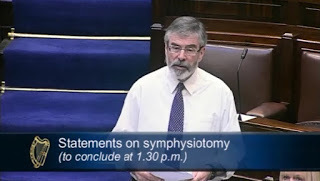
The public gallery was abnormally packed for a Thursday morning in the Dáil. It's not unusual to have groups of young people from schools visiting to watch proceedings but almost all of those present this morning were elderly women.
Another large group of women were in an adjacent room where they were watching proceedings on tv.
These are the survivors of a barbaric medical practice called symphysiotomy. I had never heard of symphysiotomy and pubiotomy until just over a year ago when this blog made the shift to Louth. It was brought to my attention by two very brave women Olivia Kearney and Catherine Naughton. Women of great grace and courage.
Since then I have met other victims and survivors, including the advocacy groups. They are all remarkable people. Last night a group of survivors, Matilda Behan, Ellen Moore, Helen Kennealy, and Anne Ward who spoke on behalf of her mother Mary MacDonogh's, gave witness and harrowing testimony to the hurt and trauma of symphysiotomy.
Their accounts were deeply distressing and upsetting for those who gave them and for us who listened in silence.
Symphysiotomy amounts to institutional abuse. It involves acts of butchery against women citizens.
It is a painful, dangerous operation that unhinges the pelvis to facilitate childbirth or in the case of pubiotomy the sawing of the public bones.
Some have sought to claim that it was a standard practice internationally but the facts contradict this. The French medical profession abandoned its use in 1798, over 200 years ago. It was regarded as too dangerous to mother and child, many of whom died. The French opted for caesarean section. It took the British another 70 years to catch on to its dangers.
But in the Irish state symphysiotomy was the method of choice between the 1940's and early 80's.
During that time it is thought that up to 1500 women were victim of this procedure, mostly without their consent. It was also inflicted on women who were used as teaching aids for doctors and nurses and students. One hospital that used it extensively was Our Lady of Lourdes Hospital in Drogheda which was run by the Medical Missionaries of Mary who exported the use of this practice to Africa and India.
Those who have campaigned on this issue for many years attribute its use by the medical profession in the south to Catholic Church dogma. The Catholic Church vehemently opposed birth control methods and the use of caesarean sections limited the number of children a woman could have. It was generally accepted that the maximum number of these that could be used on a woman was four.
The use of symphysiotomy was one way of ensuring that women didn't look to birth control.
Today there are probably no more than 200 or so survivors of symphysiotomy. They are elderly and frail citizens who carry the physical and emotional scars of this barbaric practice. Those courageous women who spoke to us last night have all suffered long term ill-health and disability as a consequence of what was done to them.
One woman who called to see me in Drogheda to tell me of her experience was Lilly McDonnell. Lilly was a victim of symphysiotomy 60 years ago. Lilly told me how her child was killed in the course of this procedure and of the physical damage done to her. She showed me the child's birth certificate.
Like the other survivors Lilly lives daily with the harrowing consequences of what was done to her.
The state should be deeply ashamed of what it allowed to happen to these women in my view because of the influence of conservative religious fundamentalism.
It should also be ashamed about its inadequate and at times heartless response to the demands of the victims for redress and truth.
In their efforts to highlight what was done to them the victims frequently met a wall of disinformation and institutionalised obstruction. Records were destroyed or 'lost' and the aftercare which they deserve was denied if they could not prove, by the presentation of medical records, what had been done to them.
The Dáil and Seanad and the government has a duty to ensure that this deep wrong is finally brought to a conclusion and in a way that is acceptable to the victims.
In a real republic the rights of these citizens would have been protected and the survivors of symphysiotomy would have had justice many years ago.
The current Minister for Health Deputy James Reilly gave his full support to the demand for a public inquiry at an Oireachtas committee hearing in 2009. Now he's the Minister with the responsibility and the power to finally make it happen.
He can authorise a full public inquiry into these events. Nothing else will suffice. Nothing else will do. Without this the campaigning but more importantly the hurt, the anguish, the grief, the bereavement for the victims will go on.
Looking up at the public gallery this morning the faces looking down were of women, grievously treated and ignored for decades and who are now mostly in their late 70s and early 80s. As each Teachta Dála stood and spoke during the debate they listened intently. Following the Ministers opening remarks Caoimhghín Ó Caoláin, who is the leader of the all-party group on this issue, and who has championed this campaign for many years, was the first to speak.
There was a spontaneous applause from the public gallery when he finished. And he speaker after that was applauded. Those who have been marginalised and whose pain was ignored were responding warmly to their issue finally being debated in the Dáil.
And when it was all over Caoimhghín sought the indulgence of the Leas Ceann Comhairle and asked those TDs present to stand and applaud the women. It was a rare emotional moment of unanimity in a chamber normally given over to the cut and thrust of verbal political battle.
But it can't end here. The Dáil and the government has to deliver for the victims and their families. I believe that with political will it can be done.
I am also convinced that a number of other justice campaigns can be resolved in this term of the Dáil.
They include Justice for the Maggies, for other victims of institutionalised abuse, including in Bethany Home, and in our Lady of Lourdes Hospital Drogheda, and victims of symphysiotomy.
All these causes are crying out for justice. We can do something about it. These women as citizens deserve our support, our love and they particularly deserve to have their wrong righted.
Published on March 15, 2012 20:47
March 14, 2012
Standing up for Ireland
If you want to know who is taking the real decisions about the economy of the Irish state then you need look no further than EU Commissioner Olli Rehn.
Since Fianna Fáil crashed the economy and Fine Gael and Labour won last years election they have repeatedly asserted that there can be no deviation from the bailout conditions set down by the EU, European Central Bank and the International Monetary Fund.
At the same time in an effort to tackle Europe's worsening economic recession and satisfy the 'markets' the EU has embarked on a series of measures which have mostly failed. The most recent, the European Fiscal Compact Treaty or more accurately the austerity treaty, is about imposing stringent fiscal control by the EU over state governments.
The Irish government was reluctantly forced to call a referendum on this austerity treaty because of its implications for the Irish constitution. Thus far the argument from the government has been that the treaty is necessary to impose what successive Ministers have described as greater fiscal discipline over EU member states.
The Treaty was signed two weeks ago but before the ink was dry on the page the Spanish Prime Minister Mariano Rajoy, fresh from signing it, told his European colleagues that Spain would defy the fiscal targets being set by the Treaty. The austerity measures were just too severe for the Spanish people and economy, he said.
So, the Finance Ministers found a compromise. Spain doesn't have to cut as much as the EU was demanding and the Spanish state is allowed to breach the fiscal targets. Not an auspicious start for a treaty which is supposedly about strict discipline.
Meanwhile the Irish government, depending on which Minister is talking to the media, has been involved in some sort of negotiation with the EU over the payment of the promissory notes.
These notes are essentially IOUs which were entered into by the last Fianna Fáil government to plug the hole in the balance sheets of Anglo-Irish Bank and Irish Nationwide which arose as a result of the greed and bad practice of those banks.
This €31 billion debt requires that the government pay €3.1 billion to Anglo Irish Bank every year for the next 10 years. As this money is borrowed the state has additional payments to make accounting for up to at least another €18 billion.
It appears the government has been trying to negotiate an arrangement under which the €31 billion is still paid but over a longer period and with less interest.
Rescheduling will simply mean that our great grandchildren will have to pick up the tab.
And it is at this point that EU Commissioner Olli Rehn has stepped in. According to the EU Commissioner the motto "pacta sunt servanda" - respect your commitments and obligations – is a key tradition in EU law.
Asked about Ireland's promissory note payment he arrogantly and patronisingly declared that each and every member state has to respect the commitments it has undertaken and this is valid in the case of Ireland.
Of course this is a nonsense. Respecting commitments and obligations within the EU was never a strong point for either France or Germany who both regularly breached the stability and growth rules.
Germany breached the deficit rules in 1994: 1996 and between 2003 and 2006 and in each year since 2009. It has broken the debt to GDP rule every year since 2003.
France has broken the deficit rule every year since 2003 and has breached the debt rule every year since 2003.
And other states have equally poor records of compliance. But according to Mr. Rehn and the EU Commission the law as applied to the Irish state is to be applied rigidly.
This bullying and belligerent stance by the EU is inevitable given the weak and obsequious attitude of the Irish government. How often has the Taoiseach asserted; ' We never looked to a debt write down' or 'we are not going to have the name defaulter written across our foreheads' , or we will not impose losses on bondholders?
Why would the EU or IMF or European Central Bank take the government seriously in any negotiation when it begins every sentence by telling the Troika that it plans to do exactly what they want?
The Irish government should reject Mr. Rehn's self-serving advice, look to the Spanish example, and do what is in the interests of the Irish state and of Irish citizens and declare its inability to pay the promissory note.
Finally, there is a US delegation in Ireland this week led by former Congressional Democratic leader Nancy Pelosi. I met them on Tuesday afternoon and briefed them on the peace process and especially its outstanding issues, and on the current state of the economy north and south.
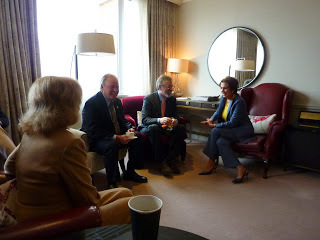
Congressional member Carolyn B Maloney; Congressional member Mike Doyle; this blog and Congressional member Nancy Pelosi.
Since Fianna Fáil crashed the economy and Fine Gael and Labour won last years election they have repeatedly asserted that there can be no deviation from the bailout conditions set down by the EU, European Central Bank and the International Monetary Fund.
At the same time in an effort to tackle Europe's worsening economic recession and satisfy the 'markets' the EU has embarked on a series of measures which have mostly failed. The most recent, the European Fiscal Compact Treaty or more accurately the austerity treaty, is about imposing stringent fiscal control by the EU over state governments.
The Irish government was reluctantly forced to call a referendum on this austerity treaty because of its implications for the Irish constitution. Thus far the argument from the government has been that the treaty is necessary to impose what successive Ministers have described as greater fiscal discipline over EU member states.
The Treaty was signed two weeks ago but before the ink was dry on the page the Spanish Prime Minister Mariano Rajoy, fresh from signing it, told his European colleagues that Spain would defy the fiscal targets being set by the Treaty. The austerity measures were just too severe for the Spanish people and economy, he said.
So, the Finance Ministers found a compromise. Spain doesn't have to cut as much as the EU was demanding and the Spanish state is allowed to breach the fiscal targets. Not an auspicious start for a treaty which is supposedly about strict discipline.
Meanwhile the Irish government, depending on which Minister is talking to the media, has been involved in some sort of negotiation with the EU over the payment of the promissory notes.
These notes are essentially IOUs which were entered into by the last Fianna Fáil government to plug the hole in the balance sheets of Anglo-Irish Bank and Irish Nationwide which arose as a result of the greed and bad practice of those banks.
This €31 billion debt requires that the government pay €3.1 billion to Anglo Irish Bank every year for the next 10 years. As this money is borrowed the state has additional payments to make accounting for up to at least another €18 billion.
It appears the government has been trying to negotiate an arrangement under which the €31 billion is still paid but over a longer period and with less interest.
Rescheduling will simply mean that our great grandchildren will have to pick up the tab.
And it is at this point that EU Commissioner Olli Rehn has stepped in. According to the EU Commissioner the motto "pacta sunt servanda" - respect your commitments and obligations – is a key tradition in EU law.
Asked about Ireland's promissory note payment he arrogantly and patronisingly declared that each and every member state has to respect the commitments it has undertaken and this is valid in the case of Ireland.
Of course this is a nonsense. Respecting commitments and obligations within the EU was never a strong point for either France or Germany who both regularly breached the stability and growth rules.
Germany breached the deficit rules in 1994: 1996 and between 2003 and 2006 and in each year since 2009. It has broken the debt to GDP rule every year since 2003.
France has broken the deficit rule every year since 2003 and has breached the debt rule every year since 2003.
And other states have equally poor records of compliance. But according to Mr. Rehn and the EU Commission the law as applied to the Irish state is to be applied rigidly.
This bullying and belligerent stance by the EU is inevitable given the weak and obsequious attitude of the Irish government. How often has the Taoiseach asserted; ' We never looked to a debt write down' or 'we are not going to have the name defaulter written across our foreheads' , or we will not impose losses on bondholders?
Why would the EU or IMF or European Central Bank take the government seriously in any negotiation when it begins every sentence by telling the Troika that it plans to do exactly what they want?
The Irish government should reject Mr. Rehn's self-serving advice, look to the Spanish example, and do what is in the interests of the Irish state and of Irish citizens and declare its inability to pay the promissory note.
Finally, there is a US delegation in Ireland this week led by former Congressional Democratic leader Nancy Pelosi. I met them on Tuesday afternoon and briefed them on the peace process and especially its outstanding issues, and on the current state of the economy north and south.

Congressional member Carolyn B Maloney; Congressional member Mike Doyle; this blog and Congressional member Nancy Pelosi.
Published on March 14, 2012 23:24
March 12, 2012
Nuala Vallely
Anyone attending fixtures in Casement Park over the years will have noticed a tall dark haired woman steward amongst the cohort of mainly middle aged men who look after everything from collecting admission money, marshalling the crowds, minding the players and match officials and looking out for everyones' safety. They – volunteers all - do a great job in foul and fair weather, for big fixtures as well as tiny little ones.
The tall dark haired woman is Nuala Vallely. She died last week. Suddenly. She was forty one years of age. Nuala collapsed at work in the Upper Springfield Development Trust last Tuesday. Her family and friends, the people of West Belfast, her workmates and especially Belfast Gaels are in deep shock at the suddenness of Nuala's death.
She was a very active member of Gort Na Mona GAC and a founder member of Gort's camogie team. She also had a longstanding grá for Saint Agnes.
This blog agrees entirely with the sentiments of the statement from Gort na Mona which described Nuala as someone who epitomised everything that is good about the GAA. She was the backbone of Cumann Luthcleas Ghael and worked extremely hard – though she enjoyed it – for our community.
That was evident at her funeral. Neighbours strung bunting in the Antrim colours along Nuala's street in Dermott Hill. Me thought that was a wonderful gesture and when we reached the offices of the Upper Springfield Trust there was a loud and sustained round of applause for this much loved woman.
She was also a wonderful mother to Rachel and a daughter, an aunt and a sister. This blog extends condolences and solidarity to all Nuala's family but particularly to Rachel.
Eight people had the gift of a better life because Nuala had the generosity and foresight to become an organ donor. The rest of us could learn a lot from her example. Go ndeanfaidh Dia trocaire uirthi.
The tall dark haired woman is Nuala Vallely. She died last week. Suddenly. She was forty one years of age. Nuala collapsed at work in the Upper Springfield Development Trust last Tuesday. Her family and friends, the people of West Belfast, her workmates and especially Belfast Gaels are in deep shock at the suddenness of Nuala's death.
She was a very active member of Gort Na Mona GAC and a founder member of Gort's camogie team. She also had a longstanding grá for Saint Agnes.
This blog agrees entirely with the sentiments of the statement from Gort na Mona which described Nuala as someone who epitomised everything that is good about the GAA. She was the backbone of Cumann Luthcleas Ghael and worked extremely hard – though she enjoyed it – for our community.
That was evident at her funeral. Neighbours strung bunting in the Antrim colours along Nuala's street in Dermott Hill. Me thought that was a wonderful gesture and when we reached the offices of the Upper Springfield Trust there was a loud and sustained round of applause for this much loved woman.
She was also a wonderful mother to Rachel and a daughter, an aunt and a sister. This blog extends condolences and solidarity to all Nuala's family but particularly to Rachel.
Eight people had the gift of a better life because Nuala had the generosity and foresight to become an organ donor. The rest of us could learn a lot from her example. Go ndeanfaidh Dia trocaire uirthi.
Published on March 12, 2012 22:22
NUALA VALLELY.
Anyone attending fixtures in Casement Park over the years will have noticed a tall dark haired woman steward amongst the cohort of mainly middle aged men who look after everything from collecting admission money, marshalling the crowds, minding the players and match officials and looking out for everyones' safety. They – volunteers all - do a great job in foul and fair weather, for big fixtures as well as tiny little ones.
The tall dark haired woman is Nuala Vallely. She died last week. Suddenly. She was forty one years of age. Nuala collapsed at work in the Upper Springfield Development Trust last Tuesday. Her family and friends, the people of West Belfast, her workmates and especially Belfast Gaels are in deep shock at the suddenness of Nuala's death.
She was a very active member of Gort Na Mona GAC and a founder member of Gort's camogie team. She also had a longstanding grá for Saint Agnes.
This blog agrees entirely with the sentiments of the statement from Gort na Mona which described Nuala as someone who epitomised everything that is good about the GAA. She was the backbone of Cumann Luthcleas Ghael and worked extremely hard – though she enjoyed it – for our community.
That was evident at her funeral. Neighbours strung bunting in the Antrim colours along Nuala's street in Dermott Hill. Me thought that was a wonderful gesture and when we reached the offices of the Upper Springfield Trust there was a loud and sustained round of applause for this much loved woman.
She was also a wonderful mother to Rachel and a daughter, an aunt and a sister. This blog extends condolences and solidarity to all Nuala's family but particularly to Rachel.
Eight people had the gift of a better life because Nuala had the generosity and foresight to become an organ donor. The rest of us could learn a lot from her example. Go ndeanfaidh Dia trocaire uirthi.
The tall dark haired woman is Nuala Vallely. She died last week. Suddenly. She was forty one years of age. Nuala collapsed at work in the Upper Springfield Development Trust last Tuesday. Her family and friends, the people of West Belfast, her workmates and especially Belfast Gaels are in deep shock at the suddenness of Nuala's death.
She was a very active member of Gort Na Mona GAC and a founder member of Gort's camogie team. She also had a longstanding grá for Saint Agnes.
This blog agrees entirely with the sentiments of the statement from Gort na Mona which described Nuala as someone who epitomised everything that is good about the GAA. She was the backbone of Cumann Luthcleas Ghael and worked extremely hard – though she enjoyed it – for our community.
That was evident at her funeral. Neighbours strung bunting in the Antrim colours along Nuala's street in Dermott Hill. Me thought that was a wonderful gesture and when we reached the offices of the Upper Springfield Trust there was a loud and sustained round of applause for this much loved woman.
She was also a wonderful mother to Rachel and a daughter, an aunt and a sister. This blog extends condolences and solidarity to all Nuala's family but particularly to Rachel.
Eight people had the gift of a better life because Nuala had the generosity and foresight to become an organ donor. The rest of us could learn a lot from her example. Go ndeanfaidh Dia trocaire uirthi.
Published on March 12, 2012 22:02
March 10, 2012
There will be a border poll
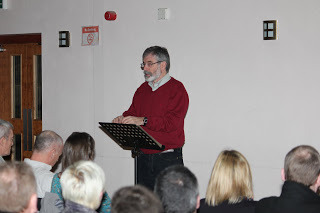
Gulladuff is a small picturesque village in south County Derry. It's home to an impressive Republican Garden of Remembrance, Lavey GAC grounds and one of the best Sinn Féin centres in Ireland.
I travelled there this morning for the Annual General Meeting of the party's Cuige organisation. Scores of party activists came to discuss recent developments and strategise on party plans for the next year.
It was a very good meeting on the back of what has been a good year for the party. Since the Cuige last met the party has fought a general election in the south, as well as Seanad, Assembly, Local Government and Presidential elections and the Dublin West by-election.
Most political parties would fell stressed after fighting one election! But the Sinn Féin organisation rose to the challenge and by any standards we have had a good year electorally. And now we're preparing for the referendum contest on the European austerity treaty.
We are also moving into the second phase of a new approach to party membership which is all about opening up our structures and facilitating a growth in membership and participation in Sinn Féin activities by ever greater numbers of people.
We have established new structures to manage the day-to-day running of party activity and have also re-organised our youth structures.
At the same time the last year has also held a series of major conferences promoting our united Ireland objective.
We are entering a period in which the anniversaries of a series of seminal events in Irish history that culminated in the partition of Ireland will be commemorated.
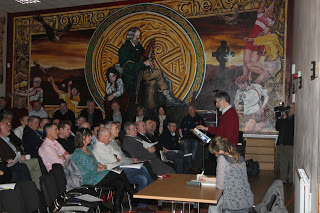
This provides a unique opportunty to examine the legacy of partition and to initiate a public debate on the desirablilty and viability of a new, united Ireland that can serve the interests of all our people.
During the week the British Secretary of State Owen Patterson entered that debate by dismissing the possibility of a border poll.
He has also blocked an enquiry into the killing of Human Rights lawyer Pat Finucane despite this being part of an inter-governmental agreement at Weston Park.
He is also blocking a Bill of Rights.
And he has been less than helpful on other matters like the Irish language.
And his imprisonment of Marion Price is entirely stupid and unjust.
But Mr. Patterson would not be one the most adroit or skillful British Secretaries of State to have been imposed on us. His remarks on the border poll have to be seen in this context.
Mr. Patterson is also a supporter of the Union. That is the position of his government at this time. Sinn Féin is not naive about this. The Tory party had to be pulled kicking and squealing into the peace process.
But now under the terms of the Good Friday Agreement the Tory/lib Dem government has specific obligations.
Despite the foot dragging that has characterised its attitude to this agreement and other agreements so far, Sinn Féin has no intention of acquiescing to British Tory game playing. Owen Patterson is but one of a long line of political overlords that Irish republicans have had to deal with, with great patience in the past.
Obviously there are elements of the Good Friday Agreement that Owen Patterson is unhappy about but he should not presume to arrogantly dictate to people here how we will conduct our affairs. Those days are over.
There will be a united Ireland. By definition that will come when the people of our island have formed a cordial union of Catholic, Protestant and Dissenter.
When a border poll is held Owen Patterson will have no vote on that issue. That is as it should be, entirely a matter for the people of Ireland.
The political landscape in the North has been transformed in recent years and there is growing support for a united Ireland.
A border poll is inevitable. Mr Patterson knows this. It is only a matter of timing. The united Ireland that Sinn Féin seeks is inclusive.
All elements of society on the island of Ireland must be comfortable and secure in the system of governance that is agreed.
It is essential that everyone has the fullest expression of their identity without intruding on the rights and entitlements of others. Diversity, equality and tolerance is the key to this.
Sinn Féin wants a united Ireland. Both governments are obliged to legislate for this. And as we continue building towards a united Ireland, Sinn Féin must also offer solutions to the problems faced by citizens in the here and now.
We want a New Republic rooted in citizens rights and people centred.
That also means the right to a decent quality of life, a job and social protections.
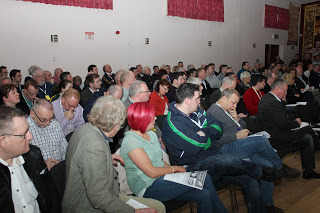
Published on March 10, 2012 19:19
Gerry Adams's Blog
- Gerry Adams's profile
- 29 followers
Gerry Adams isn't a Goodreads Author
(yet),
but they
do have a blog,
so here are some recent posts imported from
their feed.



